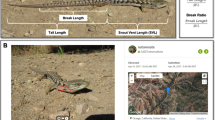Abstract
New laboratories for the Serengeti Research Institute (Fig. 1) are about to be inaugurated by the President of Tanzania, Dr Julius Nyerere. This will be an important occasion for the study of ecology and for the future rational management of the Tanzania National Parks, and the article which follows surveys the scope of the institute's research programme.
This is a preview of subscription content, access via your institution
Access options
Subscribe to this journal
Receive 51 print issues and online access
$199.00 per year
only $3.90 per issue
Buy this article
- Purchase on Springer Link
- Instant access to full article PDF
Prices may be subject to local taxes which are calculated during checkout
Similar content being viewed by others
References
Watson, R. M., thesis, Univ. Cambridge (1967).
Vesey-Fitzgerald, L. D. E. F., J. Mammal., 41, 161 (1960).
Klingel, H., Z. Tierpsychol., 24, 580 (1967).
Bell, R. H. V., in Brit. Ecol. Soc. Symp., No. 10 (1970).
Sinclair, A. R. E., thesis, Univ. Oxford (1970).
Kruuk, H., in Brit. Ecol. Soc. Symp., No. 10 (1970).
Author information
Authors and Affiliations
Rights and permissions
About this article
Cite this article
LAMPREY, H., KRUUK, H. & NORTON-GRIFFITHS, M. Research in the Serengeti. Nature 230, 497–499 (1971). https://doi.org/10.1038/230497a0
Issue Date:
DOI: https://doi.org/10.1038/230497a0
Comments
By submitting a comment you agree to abide by our Terms and Community Guidelines. If you find something abusive or that does not comply with our terms or guidelines please flag it as inappropriate.



